



Portfolio Lead at ACT research

"I want to get vaccinated because I'm afraid to die."
"I don’t want to be vaccinated because I am afraid I will die."
In fact, the whole difference between these two sentences is in one word, behind which is hidden a huge fear and a dark tunnel. This "no" means- to receive the vague, information-deprived fear and let it into you; recognizing people, who speak dogmas instead of sound arguments and emphasizing, that we put ourselves above the public good. On the one hand, there is nothing unusual in this, because man is a rational but selfish animal who once found the easiest way to survive by uniting in society. However, I wonder what can happen when being in a team no longer guarantees survival? Then he goes and starts watching alone from the cave. We have been watching the world from the "cave" (from homes, the Internet) for 2 years now, and periodically, separate opportunities to go out only intensify our natural desire - not to be alone and not to be locked up.
Registered cases of coronavirus have exceeded 200 million worldwide, with more than 4 million deaths. The spread of the virus is facilitated by 1) the gathering or socialization of people, 2) the disruption of distancing, or the attempt of people to be closer to others, 3) the rejection of vaccines, or the non-recognition of science, which is based on a collective mind and is smarter. According to the New York Times Coronavirus World Map, the blast of corona occurred most recently in six countries, including Georgia (Fiji, Botswana, Cuba, Georgia, Malaysia and Spain).
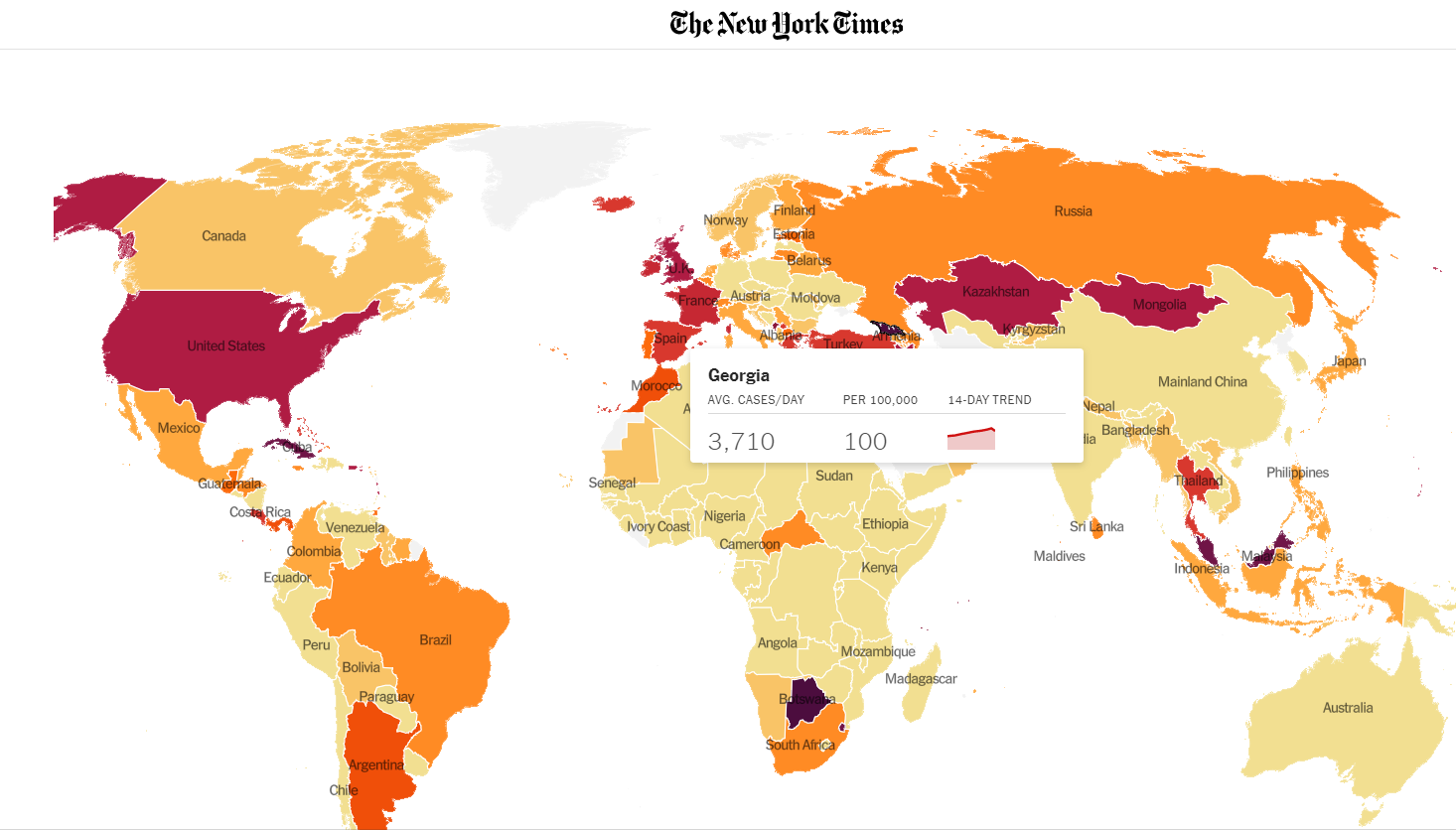
Source: NewYorkTimes
In order to survive, the virus undergoes constant mutation. At this point it is actively spreading as a delta variant, which is more contagious. Mitigating restrictions and resistance to Delta strain vaccination have led to a rapid increase in the number of people infected with the virus worldwide; Including in rich countries with high vaccination rates. However, the main effect of vaccination is to reduce the number of hospitalized patients who pass the disease at home in a relatively simple form after vaccination. This means easing the pressure on the healthcare system, which is a difficult challenge for rich countries and an almost insurmountable challenge for developing countries.
There are currently more than 4 billion doses of the vaccine registered worldwide, with an average of 55 doses per 100 people. Most rich countries have already been able to get full (double) vaccinations for an average of 80% of the population, while the rate for poorer countries is no more than 5%.
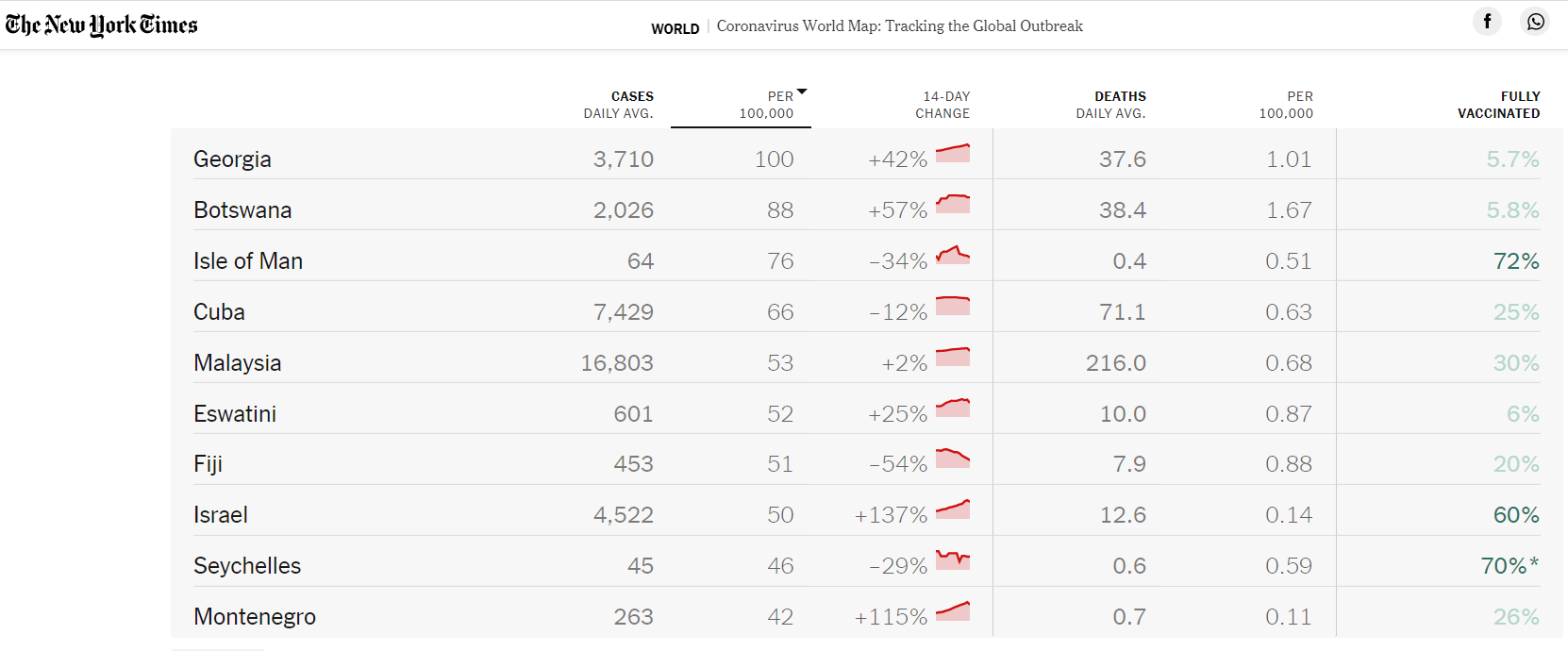
Source: NewYorkTimes
This world map counts the number of cases per 100,000 inhabitants and the highest rate - 100 covid-infected, our country has. According to the data of August 14, Georgia is in the first place in the top ten of the world rankings with the spread of the disease, the dynamics of deaths is also high. From July onwards, the death toll rises daily or fluctuates above the upper average. In these statistics, Georgia has another negative indicator - only 5.7% of the population has been fully vaccinated, which ranks the country 113th (5.7%) in the overall ranking of double vaccination rates. The single vaccination rate is only 13%, while for European countries this figure has long exceeded 50%.
As early as June, before the US government donated half a million doses of Pfizer to the Georgian people as part of the Biden-Harris administration's global vaccination initiative, ACT conducted a study. According to the survey, every third (33%) of the surveyed Tbilisians were hesitant to get vaccinated, while 22% peremptorily said they would not get vaccinated. If we add to the above-mentioned ambiguity all the negative factors influencing the decision, which the respondents named, it becomes clear that the vaccination process is hindered by the lack of information. Against this background, there is a high degree of distortion of scarce information ("vaccination changes the genetic code", "causes infertility") or interpretation (vaccination is designed to "chip" the population, "5G technology is activated in humans after vaccination), which is experienced by most people.
One in three respondents who could not decide whether to get vaccinated cited a possible allergic reaction to the vaccine as the main reason for the rejection. Other impediments are again related to lack of information - the population a) worries about the quality of the vaccine imported into the country (28%), b) thinks that the vaccine will be harmful to his health (10%), or c) it can't protect/alleviate his condition when infected ( 7%).
More information about vaccination side effects - World statistics and degree of complications Increase in the number of people vaccinated and their observation, successful and recognized vaccines - As it turns out, Tbilisians pay attention to all these factors to make sure they need vaccination and expect information on these topics. , Those who are still thinking - whether to be vaccinated or not.
When filling the information vacuum, those in charge may take into account that most of those who hesitate to get vaccinated do not trust any source of information. A small number of them trust the World Health Organization, doctors / infectious disease specialists and the Ministry of Health of Georgia. Recommendations of relatives and acquaintances has a low rate, although it is slightly higher than the percentage of media and healthcare authorities. Understanding these data makes it clear that people need to receive official information from those responsible in this field and expect very specific explanations from them.
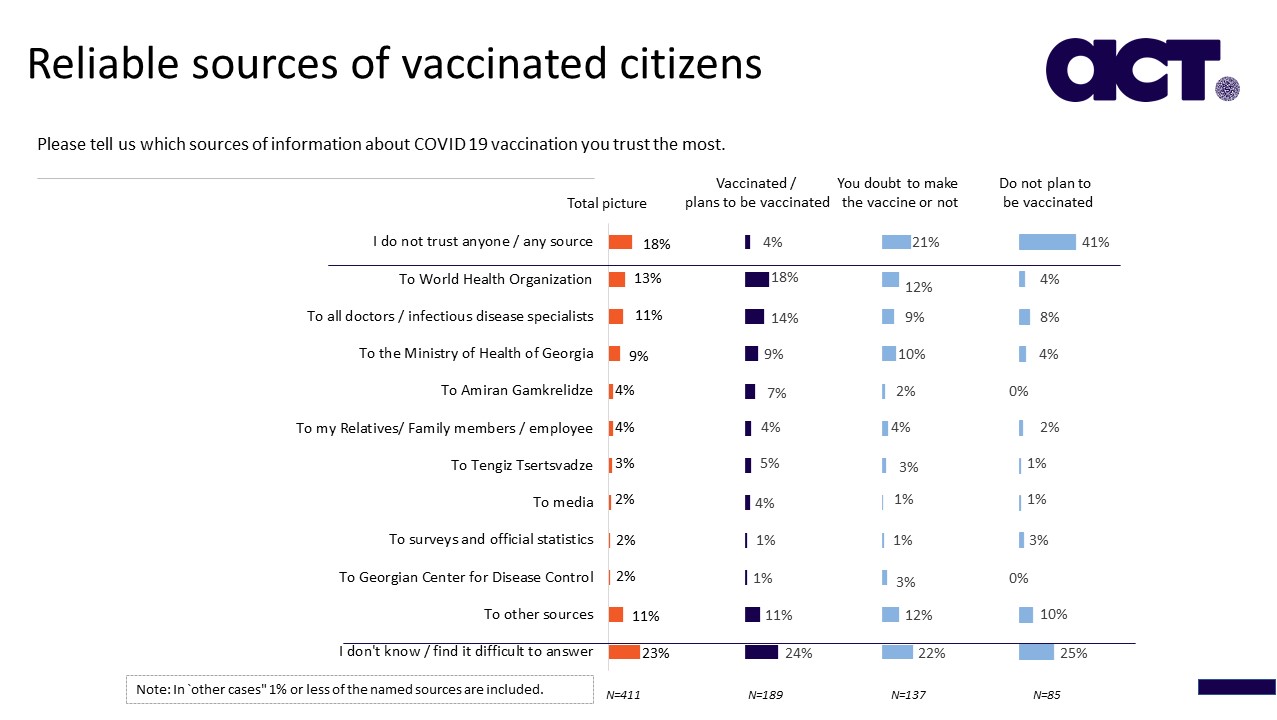
And those citizens who do not plan to be vaccinated in no case do not trust any source of information at all. In communicative language, this means that the stereotypical threshold is quite high and people block access to information themselves - every fourth respondent against the vaccine finds it difficult to name any specific, credible source of information; They also have low expectations of receiving information from officially responsible organizations or structures. However, this part of the respondents expresses the most trust in personal contacts and therefore, it is possible to work with them by activating this personal information field.
The fact is, that our country at this point stands out negatively in the overall ratings related to the corona. It means that something is not going right. Covid management consists of many components, however when we all rely on the main, human factor and the responsibility of each of us, then, the main tool of action again are the people, their involvement in the process and, consequently, the right communication with them.
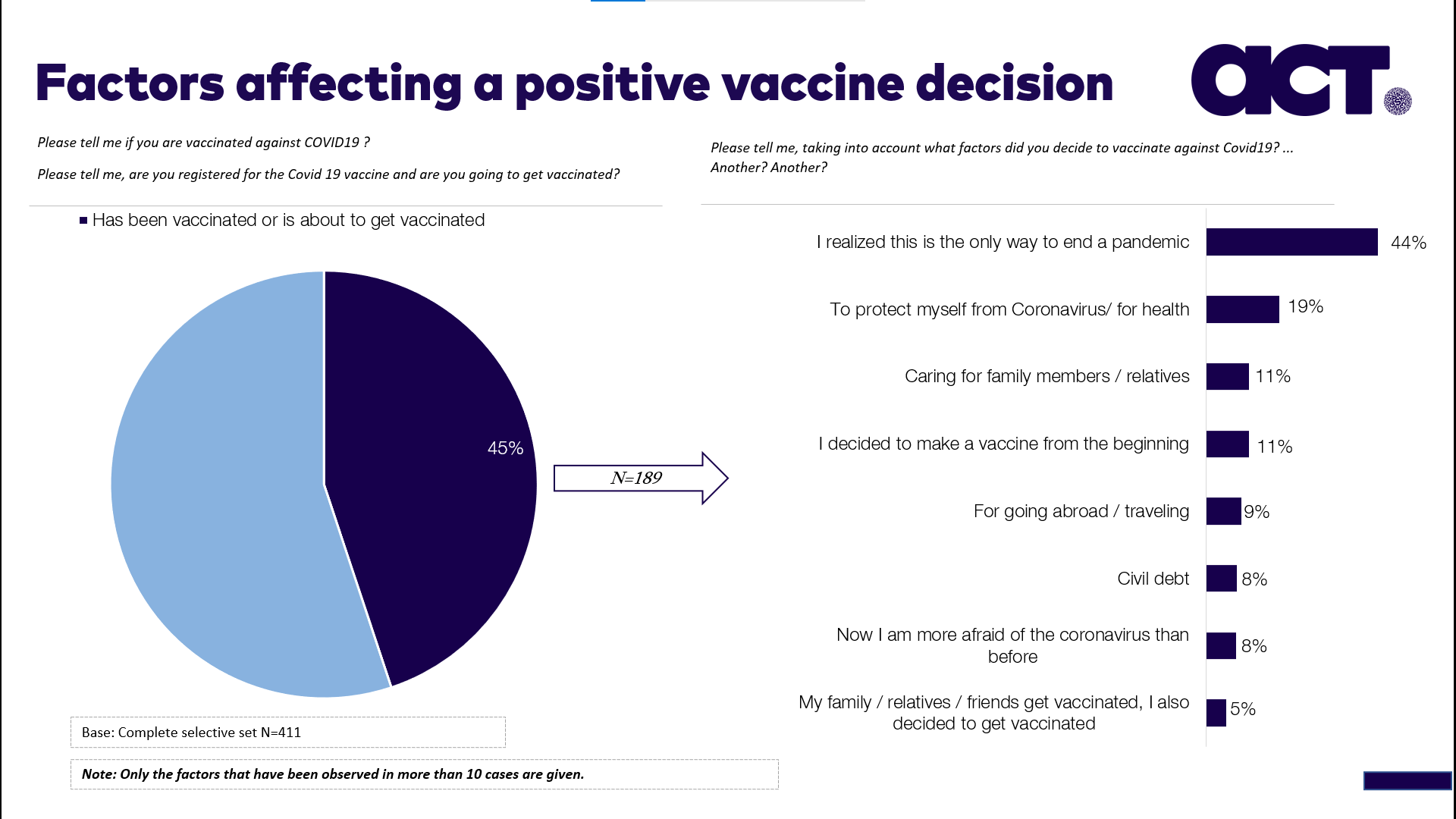
If we listen to them and respond to the biggest fear in the world - the fear of loneliness, which we have been feeling for two years now, we can build a strategy based on the following points:
Talk to those who are complaining. The logic is simple, it is time to let go of those who categorically refuse and focus all our time and energy on people who are unable to make a decision for various reasons. In total, including these people we get to the necessary 60% that we need to defeat Corona
Use official data as a reliable source for them, and healthcare associates as communicators
Instead of appealing to the pros and cons of vaccination, focus on the knowledge of managing side effects and improving that knowledge.
We must activate the information campaign in the context of recognized vaccines
Increase communication with emotional parameters - give a promise to defeat the pandemic, return to normal life and get out of the cave, out of loneliness. Encourage people to feel - how they can take care of their personal health and well-being while at the same time protecting their closest people. Let's do all this so that we are not left alone again and again near the entrance of the "cave".
As long as the people in charge take care of this, you also have the leverage: if you want 2 years of loneliness to end soon, your share of the vaccine bullet must be fired right now. Even from the "cave".
Adapting to covid-reality has become a necessity of the present. People have to learn to live with it, and countries have to determine the consequences of a pandemic and work actively on it. The sphere of education did not lag behind this covid chaos. This sphere received a rather strong blow. First the learning process was stopped everywhere and then, all over the world had to continue the learning path in a new format.
The World Bank released a special report in 2020 on the impact of COVID-19 on higher education. As a result of the situational analysis of Europe and Asia, the report identified several important problems that affected the higher education institutions of these two continents as a result of the pandemic. It has been found that the problem of internet delivery is equally troubling to people on different continents - low speeds fail to provide a dynamic online learning process, and better quality service is an expensive pleasure for many of them. In addition, access to personal computers was a problem. Added to all this was the fact that the higher education institutions themselves did not have the necessary infrastructure for online teaching, which would have been targeted at a large number of users, nor were members of the academic team ready to fully digitize the lectures. In addition, the World Bank report also states that distance learning is not always effective, especially during activities such as discussions, interactive group work, and more. That is, everything that helps the student to develop the necessary skills. The report also noted that the focus on cognitive skills was often at the expense of socio-emotional skills, which is also a significant challenge.
According to international studies, the pandemic has affected the lives of more than 200 million people worldwide, including more than 157,000 Georgian students. Along with the main actors in the field of higher education - students, members of the academic and administrative teams of universities also found themselves in this whirlpool of uncertainty. Following in the footsteps of the transformed learning process, at ACT we decided to find out how ordinary Tbilisians value online learning and what they consider to be the biggest problem. As the results of the survey conducted in June show, in general, taking into account all the factors, the surveyed Tbilisians evaluate negatively online learning [out of a maximum of 10 points, this impact is assessed at 4.1 points]. Assessing the specific impact it has had on our country's higher education, the answer is even more negative [3.3 points out of a maximum of 10 points].
We asked our respondents what the difficulties were / are related to the transition of universities to online education due to the pandemic. 18% said that not everyone had / does not have access to the Internet; The other 18% cited the lack of the necessary material and technical base for online learning as the main difficulty, which combines the lack of a personal computer, lack of workspace and other technical problems. Among these difficulties, unequal access to the Internet was named as the "most problematic" for 19%.
Chart # 1. Difficulties Faced with Higher Education Institutions Switching to Online Education Due to Pandemic
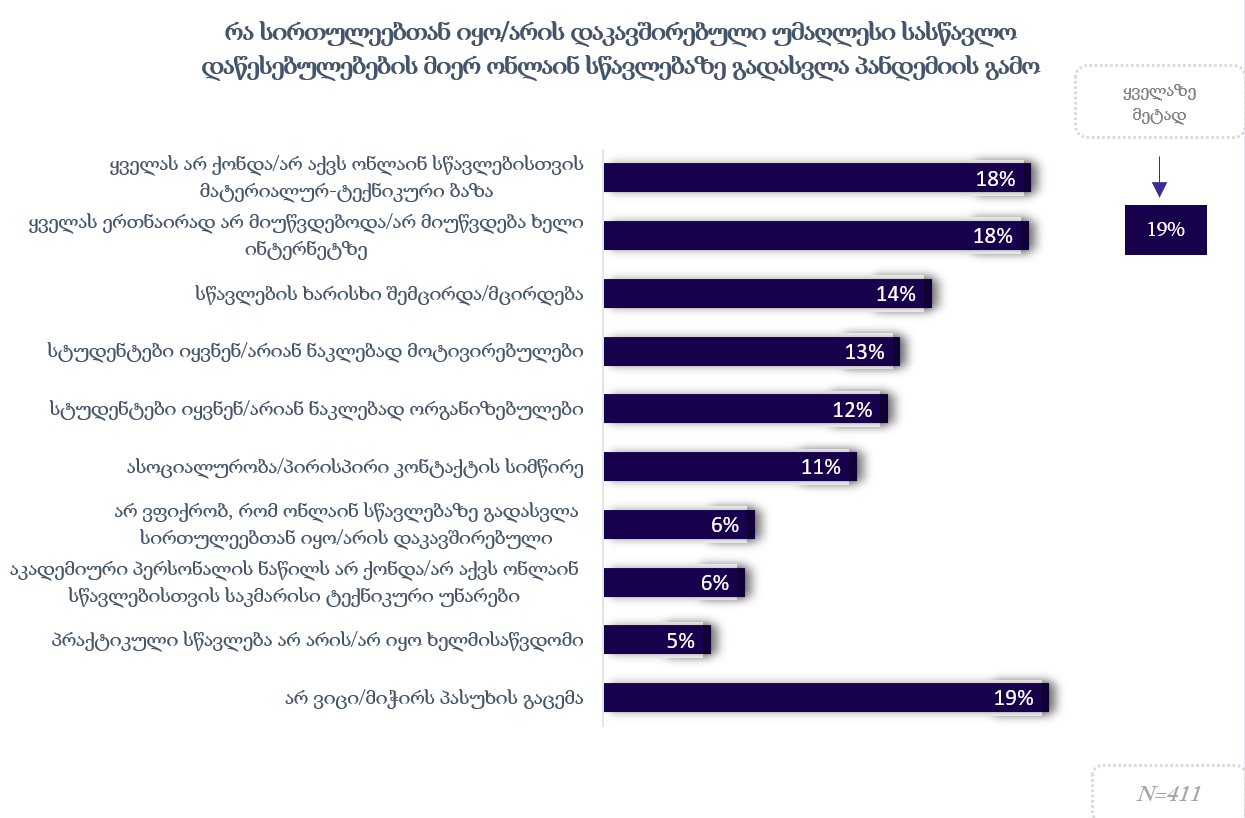
At the end of last year, we conducted a survey for the United Nations Population Fund to assess the socio-economic impact of COVID-19 on young people, and it is interesting to note that similar views and problems were identified with young people directly related to online learning. Young people living in Tbilisi, Imereti, Kakheti, Kvemo Kartli and Samtskhe-Javakheti participated in the study. Difficulties with online learning were cited as low readiness and technical problems for students and academic staff in online learning: low access to the Internet and lack of the necessary material and technical base for online learning. The latter problem was particularly acute in families with several members having to study and work online.
Another result of our survey is interesting - according to one in ten Tbilisians surveyed, the transition to online education has turned out to be quite negative for a certain group of society, which is associated with asociality and related stress. 11% of respondents named the lack of socialization as a serious problem, which in the future may create mental health problems for both young people and people of different generations. Incidentally, this challenge was also named as one of the topical problems in the above-mentioned survey conducted for the UN Population Fund.
It is true that online learning has been and still is associated with many difficulties, however, this method also has its advantages. We asked Tbilisians what they think is the positive effect of online learning. One in ten respondents found it difficult to assess this (12%), and 21% do not think that switching to online learning can have any positive effect at all. However, when talking about the benefits of online learning, the majority of respondents identified two important factors - saving time by 21% and protecting against the spread of the virus in a pandemic, or safety by 20%.
Graph # 2. Positive effects of online learning
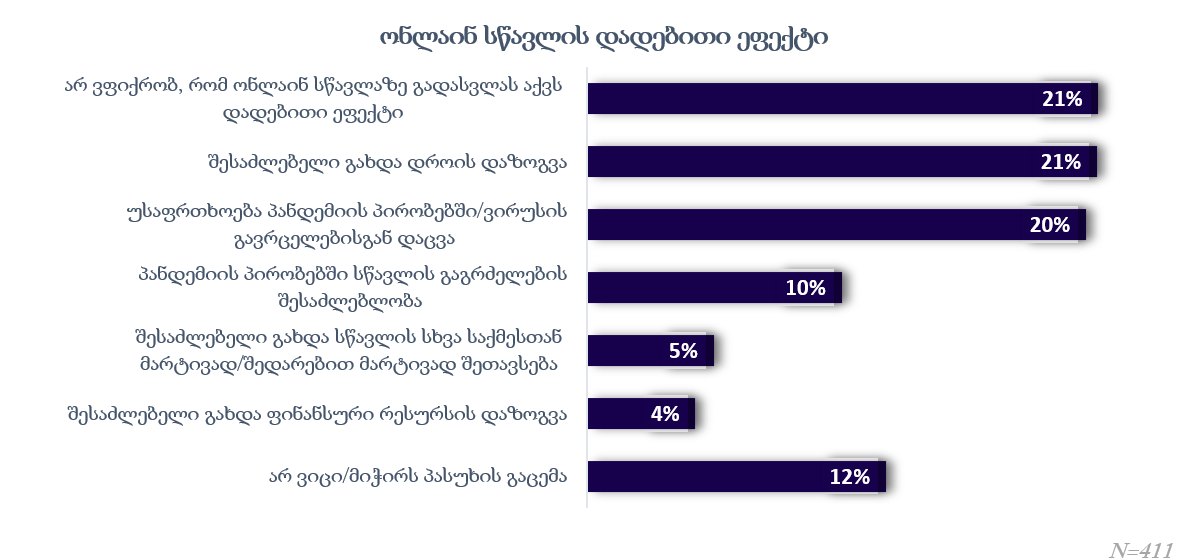
As it turns out, online learning directly for young people also has its positive effects - in addition to saving time and financial resources, it allows students to easily combine learning for other jobs. These positive aspects of online learning were revealed by a survey of young people at the end of last year. The same study then also showed that because of the advantages listed, the transition to a hybrid learning model was considered important by young people.
Talking about the positive aspects of online learning, young people mentioned one more thing - the introduction of this new format has increased the opportunity and made it accessible to both Georgian and international online training courses. This is an important and strong argument for those who want to learn and develop.
Respondents were also asked what they thought the university teaching format should look like after the pandemic ended. It was found that the majority of Tbilisians surveyed (57%) support the idea of only offline (audit) teaching. However, the hybrid learning format also has enough proponents - 39%.
Graph # 3. What should be the format of university teaching after the end of the pandemic
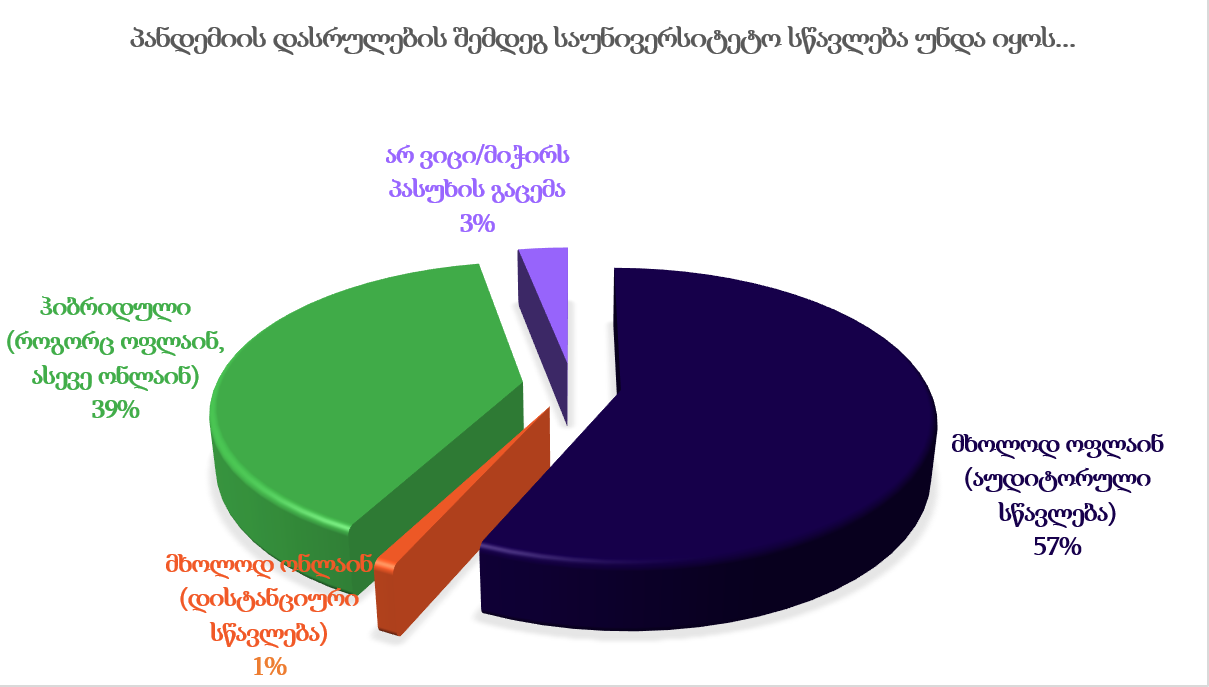
Despite the difficulties associated with online learning, the idea of hybrid learning is uniquely welcomed by young people. Because the main positive effect - "combining learning with other things" turned out to be quite a weighty argument for them. That is why it is quite natural that young people will be happy to meet the existence of a hybrid learning format in the post-covid reality.
However, despite the positive attitudes of young people towards hybrid education, the transition to such a model of the Georgian university system may be premature. At this stage, the mixed model of teaching in universities is a forced response to the challenge and not a new format of teaching, which was developed to create an effective university education system.
According to the World Health Organization, the pandemic will not only be defeated, but will regain strength by the fall, and there is a high probability that distance learning and work will become an inevitable reality in the near future. That is why, with regard to the future prospects of online learning, the European Commission has developed the Digital Education Action Plan (2021-2027) for the coming years, which outlines the priorities to be focused on outcome-oriented learning. Conducting more digital specialists, as well as creating user-friendly mechanisms and secure platforms that adhere to e-privacy and ethical standards.
Naturally, all these issues will be relevant for Georgia as well, and we can confidently assume that distance learning will become an essential component of higher education. Only time will tell how our country will be able to cope with this challenge and provide quality education for future generations. However, one thing is clear - the need to switch to forced online learning will at least help increase the digital competencies of both students and academics, enhance digital capabilities by universities, improve software, and create quality content for e-learning. It undoubtedly has the advantages that can be used effectively and boldly in the post-pandemic reality of education.
[1] COVID-19 Impact on Tertiary Education in Europe and Central Asia
[2] საქსტატი
[3] Farnell, T., et al., 2021. The impact of COVID-19 on higher education: a review of emerging evidence. Analytical report. European Commission. EU Publications.
[4] Assessing the Socio-economic Impact of COVID-19 on Young People in Georgia
[5] Assessing the Socio-economic Impact of COVID-19 on Young People in Georgia
You have probably asked yourself this question many times for yourself and those gathered with friends, you have often talked to yourself - when will we be able to travel? We check the list of co-safe countries on the Internet and read, "Are we on the list of countries with red or orange status now?" On the street we are watching for a small groups of tourists and we surprised of their courage.
Since the COVID-19 pandemic was declared in March 2020, everyday life around the world has changed radically. Among the affected sectors, tourism has been named as one of the most "dangerous" activities, and if we borrow the OECD study, in 2020, even about 80% decline in international tourism worldwide was expected. But tourism is one of the important sources of economic growth in Georgia. If we look at the numbers, we will see that the revenues from this sector increased from 5% to 18% of GDP during 2010-2019, which significantly increased the budget. One is the budget, and the other is the people, who have found a source of income in this sector.
The tourism during Covid 19 like swinging on the waves - a reduction in regulations is often followed by an increase in the number of flights, overcrowded hotels, which seems to revive it. However, each new wave of pandemics detected from time to time makes today's fragile environment even more unreliable and puts the country back in a state of uncertainty. What solution remains when the environment is so volatile and the tourism sector is completely dependent on it?
The general answer to this question might be to adapt, to adapt tourism to the existing reality. However, today, traveling as a tourist does not sound very attractive. The reason for this is the feeling of insecurity, the constantly changing rate of the covid-infected, the risks of closing the borders again in a foreign country, and so on. It is at this time that domestic tourism becomes relatively promising, which avoids certain risks and allows for short-term travel.
Based on the data of the National Statistics Office of Georgia in recent years (2016-2020), it can be said that about half of the residents aged 15 and older travel within the country primarily to visit friends and relatives. It lags far behind the number of travelers for other reasons (shopping, treatment, etc.). And even 10% of our citizens do not travel locally for leisure and entertainment. It is true that this number almost doubles during the summer, but the fact is that travel in own country for leisure and fun remains a very unpopular topic. Anyway, it was like that before the pandemic and it is like that now, even in the first quarter of 2021. As expected, Tbilisi, Imereti and Adjara A / R are among the most actively visited places. By the way, in the conditions of the pandemic, compared to previous years, the number of people wishing to spend their vacation in cottages has almost doubled (up to 16%).
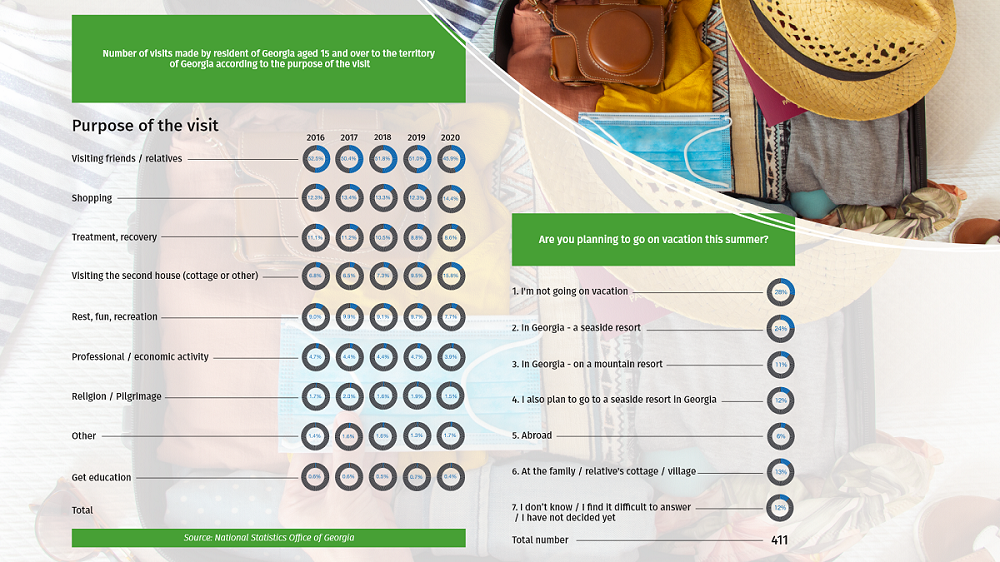
"I remember being proud and enjoying my lifestyle, constant travels and adventures: Berlin, Paris, Dhaka, New Delhi, Kerala ... different countries, cultures and news," said Salome, who traveled abroad quite often before the pandemic. - "Once, a friend came from Bangladesh and called me to meet him for a while. The whole evening, he was talking about Racha, Svaneti and even some lakes in astonishment. He was asking me with round eyes - what? You don't know it?. A few months after the start of the pandemic, I realized that now was the time for me to get to know my country. I have a plan - I have to visit all the national parks of Georgia this year! Reserves, see lakes. I have already been to Tskaltubo, to Kazbegi. In Samtskhe-Javakheti I also saw birds of strange beauty sitting on the lakes and I know, that now I am planning go at Chiatura. "
The survey showed that 28% of the population aged 18+ have no plans to leave the capital at all in the summer. 9% of them refused to leave Tbilisi this year because of the pandemic, citing the risks of safe vacations and declining incomes as the main reasons. 12% of respondents have not yet decided whether to rest, which is mainly attributed to the job or lack of finances.
Most of the respondents, at least 60%, consider traveling in the summer, although very few of them plan to spend the summer abroad (6%). The research showed that those who want to leave the city in summer are mostly under 54-year-olds from Tbilisi. Among them, young people under the age of 34 are mainly going to spend the holidays at the sea or in the mountains, while the population aged 35-54 is equally desirable to spend the holidays at the sea and at the family / relative's cottage.
It should come as no surprise that due to the pandemic, more than half of the population is quite confused about summer plans, which is related to the selected vacation spot, duration and, most of all, budget. One-fifth (20%) of the respondents had to change their vacation location, mostly people who had visited both sea and mountain resorts before the pandemic and / or were actively traveling abroad. It was also revealed that due to the complicated economic situation due to the pandemic and the lack of desire to stay in a foreign environment for a long time, a large proportion of travelers prefer short-term travel to long-term vacation.
Although the creation of the vaccine has raised positive expectations in the society, the problem in the tourism sector is still relevant for Georgia and the world. Moreover, the OECD predicts that in 2021 we will have to live in "survival mode" again and return to the usual mode of tourism, will remain a matter of the future. Against this background, the importance of such factors as the availability of vaccines, the increase in the number of vaccinated people, the removal of restrictions in the face of mitigated pandemic waves, etc. is becoming increasingly important. All this is directly related to the activation of tourism processes, which is vital for a country like Georgia. For a country for which tourism is one of the most important ways to deal with unemployment.
* A survey was conducted in June 2021, by random sampling, with 411 adult residents of Tbilisi. Method used - telephone interview. The statistical error of the data does not exceed 4.9%.
As the Coronavirus pandemic started, economic downfall made society face threat of unemployment and loss of incomes. Drastic decrease of incomes is directly connected to purchasing capacities and considering tendency of growing prices on food products, the picture is not that pleasant. It’s a fact, that this situation hits low income families the most who spend the majority of their incomes on food.
When compared to the previous year, prices on food globally increased by 14% in 2021 (World Bank, Food Price Index 2021), Georgia did not fall behind this negative tendency. In April of the current year, ACT got interested in the impact of increased prices and inquired respondents on the dynamics of costs spent on food and frequency of using different products over the past 6 months.
Growth rates
In the spring time, social media was overflowed by record growth of oil price and this became a popular topic for discussions or jokes. Even though the price of oil reached its historic maximum price since 2008, unfortunately, oil was not the only main character in this story and the pandemic appeared to be pushing prices up and up on food products. Based on National Statistics Office of Georgia, prices in food category went up by 0.3% in April compared to the previous month which was reflected in 0.1% growth in 7.2% inflation rate. In good categories, prices of fruit and oil, fish and sweets showed the biggest growth rate:
The majority of 401 respondents we inquired, confirmed drastic increase of prices and declared that they have to spend more and more on food recently. If we look at data in age perspective, the picture is similar for all age groups – the majority of respondents (averagely 75%) in 18-34, 35-54 and 55+ age groups report on noticeable growth of prices in food category over the past 6 months.
According to the study results, the most frequently used products (everyday, several times a week) include bread and bakery, vegetables, fruit, dairy products and sweets for the majority of respondents. Relatively less frequently consumed products are frozen and canned meals, fish and oil, butter, sugar and cheese. If we compare this list to the dynamics of prices provided by GeoStat, we’ll see that most frequently used food products are now more expensive. The products listed below take the majority of space in consumer basket according to frequency of use.
Impact of the shock
To sum up briefly, the pandemic and its negative effects on the economy was not unexpected – breach in food supply chain and delaying processes logically follow similar crisis. The Coronavirus pandemic caused delays in functioning of global food value chains, which affected every phase of food supply. This all originated from the restrictions and regulations set in forth by governments of different countries.
For now, food prices have to cope with the shock caused by the pandemic. Prices increase from month to month, as well as annually. Even though developing, food importer countries are number one target for price growth caused by the pandemic, however, in import-depended Georgia where other external economic factors are actively making impact, including depreciation of the national currency, growth of prices on food products is even more evident and noticeable.